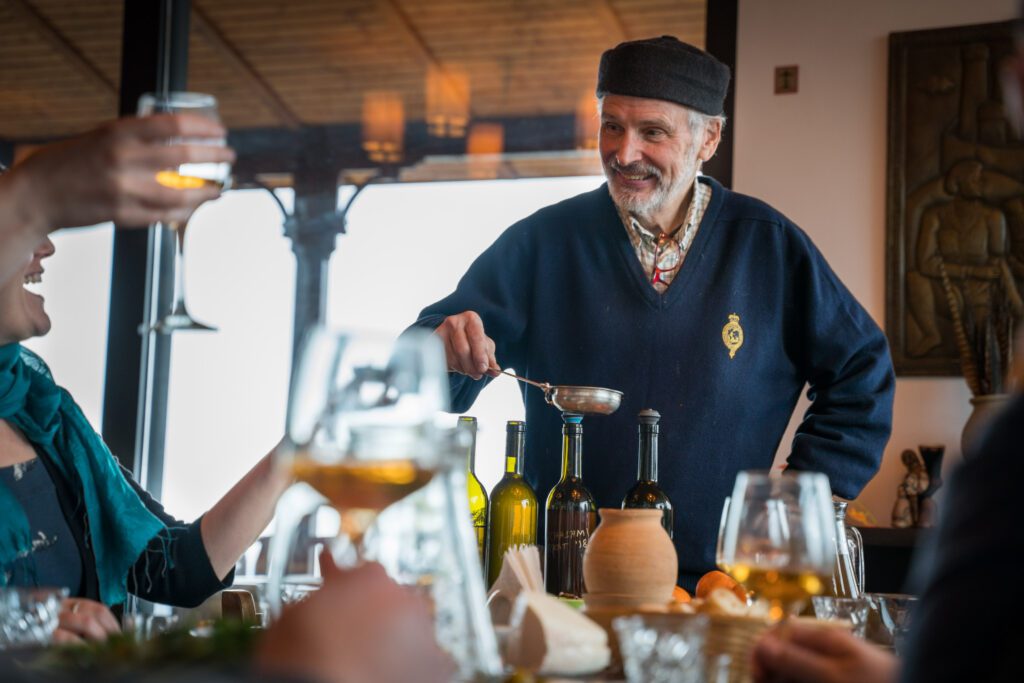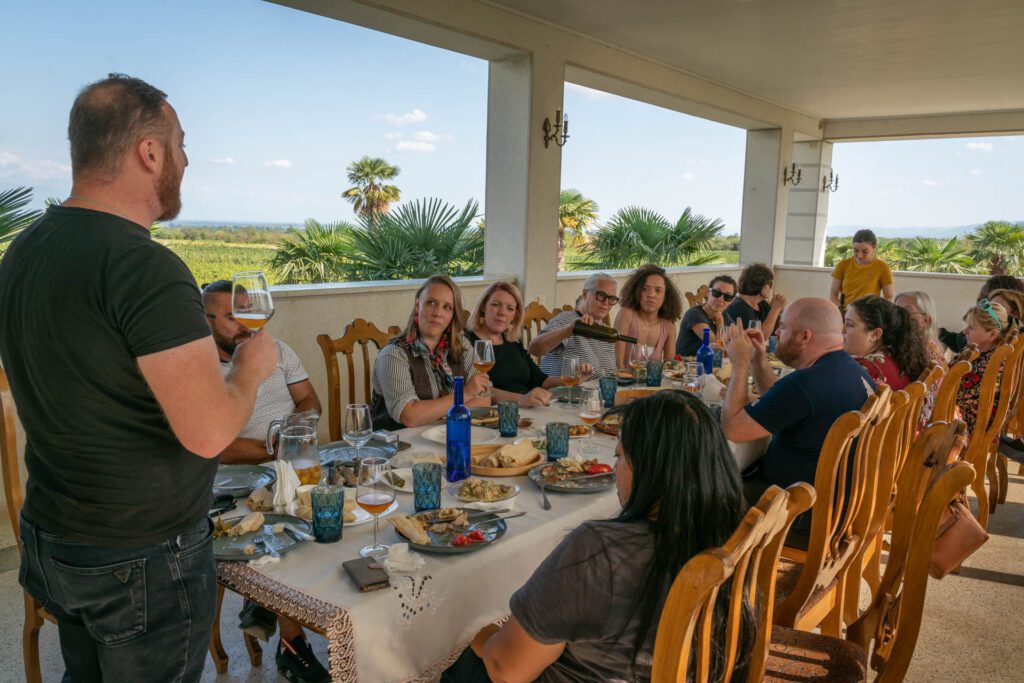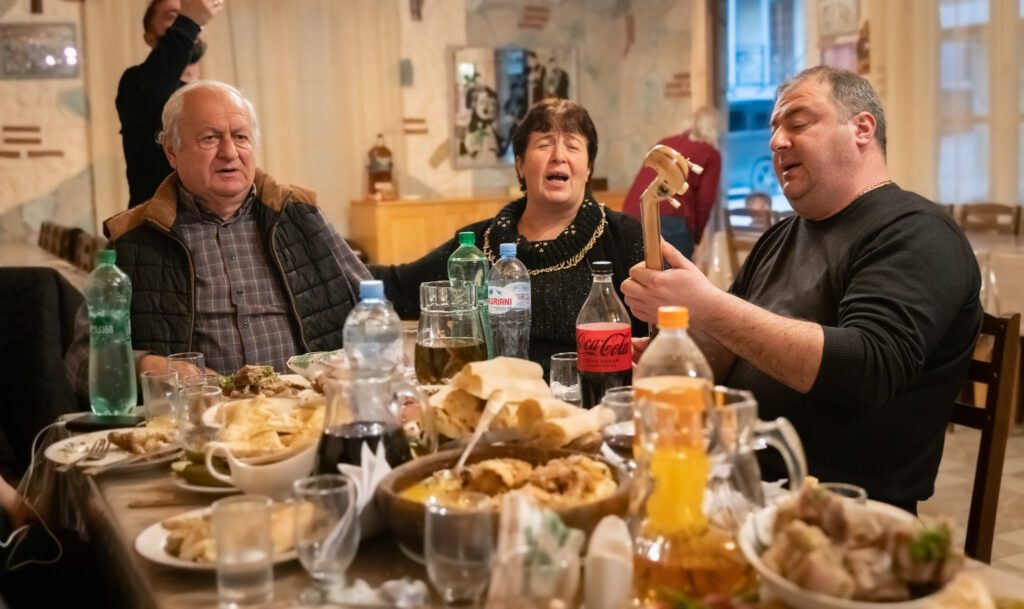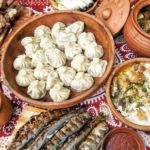Love consuming your information via podcast? Then listen to our Supra Episodes on the Tbilisi Podcast:
What is a Supra?
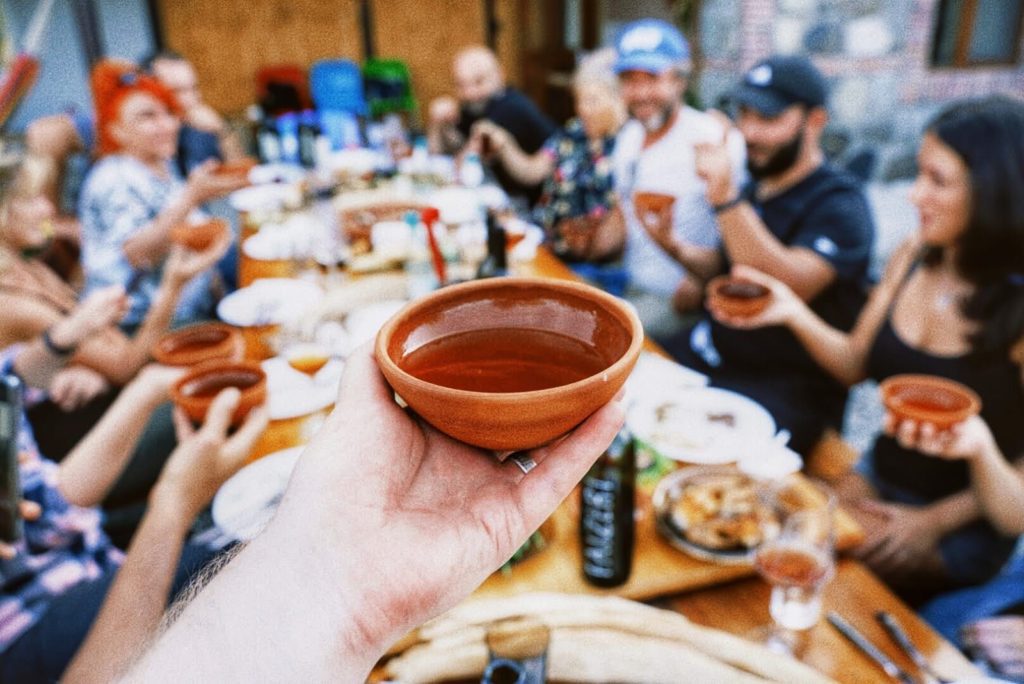
Georgian Supra
What is a Tamada?
Formal Types of Supra
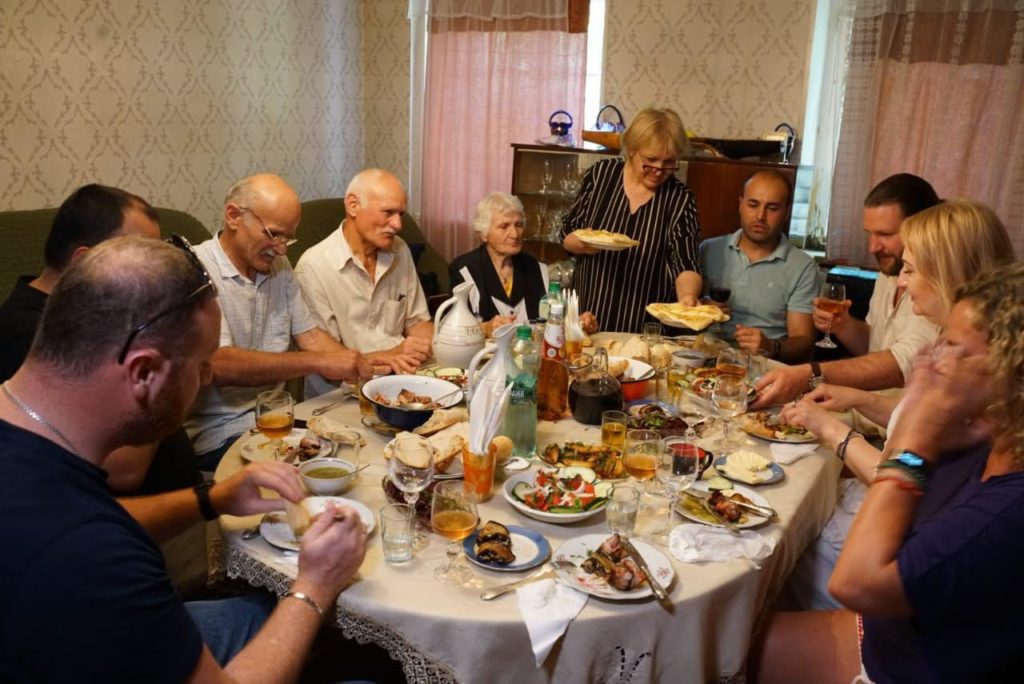
Supra in Georgia
-
to the deceased and wishes him/her eternal peace.
-
He then drinks to the memory heavenly well-being of the deceased’s dead relatives
-
Finally, he toasts all the relevant family of the deceased who are still alive, followed by the bereaved themselves
==> Want to experience a Supra in Georgia? 
Want to join a supra when you visit Georgia? Check out this real family supra tour – feast with a winemaker and their family.
A tour company owned and run by Tommo & Megsy – the writers of this blog!
History Of the Supra
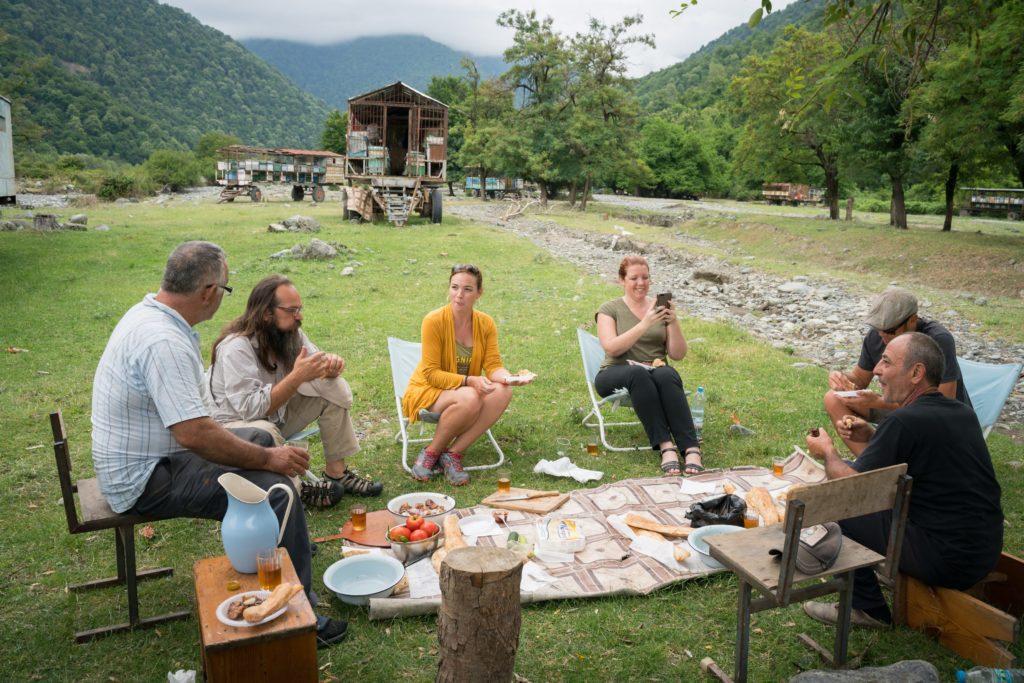
A Georgian Supra we had instead of collecting honey from the bees. (listen to the podcast for the full story)
Top Tips For Attending Your First Supra
-
it is important to be careful and drink slowly/reasonably as we have many, long toasts, in order not to be overdrunk and understand important details of Georgian supra.
-
never be afraid of making your own toast while attending Georgian supra, tamada would be happy and listen to your words with pleasure, just let him know that you want to say something after him.
-
Goat’s Horn is one of the most important parts of Georgian supra and it will definitely appear during Supra. quite frightening for foreigners 😃 but don’t be afraid, if you can not do that just use the Georgian word “Alaverdi” “ალავერდი” and give it to somebody who can drink wine from that!
-
remember, it is optional to drink a glass of wine completely for each toast or sip by sip, it is up to you! nobody is going to force you, they will respect your choice. Even if you’re a man – when you are a foreigner they respect your choice (sometimes not 😃 but according to history Georgians don’t force others to drink as much as Georgians)
-
if the host asks you which wine in Georgia is your favorite you have to answer: your wine is the best of all i have ever tasted 😃
-
I would warn them that meat and nicer food would come a bit later and they should try and not fill up on Khachapuri etc.
-
be careful if downing whole glasses of wine as there will be a lot of toasts and he/she would need some resistance if they are not good drinkers
-
also there is this tradition of ‘alaverdi shentan’ when you need to respond to the toast in a toast manner when someone is ‘Alaverdi’ with you. It has to carry on from the previous toast – The idea is that it has to come from your heart, instantly.
-
Don’t fill up at the bread and pkhali stage, because even though the table seems full of food, that’s only the beginning. Save room for the delicious meats that are coming!
-
Drink a bit of the sweet sugary pear/tarragon/saperavi whatever flavoured lemonade. The sugar actually expands your stomach and means you can eat more lol.
-
If you don’t have a high alcohol tolerance, have something else to drink between toasts and only drink wine during toasts
-
If possible keep a smaller separate glass just for toasts that you can regulate – you don’t want to have been given a new full glass of wine and have to down it all because there was a toast.
Amazing Supra vs Passable Supra
IN SUMMARY: An amazing supra has an eloquent, dynamic tamada (toastmaster) who reads the room and makes the event interactive. Diverse and delicious food, high quality wine (not basic bulk wine), polyphonic singing, and dancing. A passable supra lacks some or most of these elements.
The supra is one of Georgia’s most quintessential (and glorious!) experiences. A rollercoaster of food, wine, history, culture and emotions. I’ve laughed heartily, cried, and shared heartfelt stories (of the host, guests and of my own) that you’d never expect a stiff-upper-lipped Englishman to say out loud.
The supra is about human connection as much as the wine and food. Though any gathering where friends share food, wine, and toasts can be called a supra, the best ones include the best of everything and leave you feeling like you really experienced life, on a level you were not expecting.
But, from someone who has traveled across Georgia, experiencing many standards of supra, let me explain the difference between a passable one (which is still worth it, if you can’t do better) and a life-changing one.
The Tamada (Toastmaster)
The tamada is the lynchpin of the Supra. They guide the event. They lead the toasts. They work the room. A great tamada is truly masterful at social dynamics.
- A great tamada brings life to every toast. They are eloquent, even poetic in their mastery of the topics they present. They weave surprising stories on every theme of the supra.
- A great tamada leads other guests to contribute, rather than hogging the limelight for themselves. They connect all the guests together.
- A great tamada reads the room and guides the topics of the toasts in waves along with the mood.
- A great tamada compels attention and touches on every emotion over the course of the supra.
- A great tamada drinks to every toast but does not ever act inebriated.
A poor tamada fails at most or all of these elements and simply makes basic toasts “to peace”, “to love” without providing depth or real connectivity. The language barrier can make it difficult for foreigners to experience all of the above, so finding an excellent English-speaking tamada, or having a great translator/guide with you is essential. Though eloquence may be lost in translation, a masterful tamada can perform all the other skills above, even with more basic English.
The Food & Wine
The food should be traditional, though really the rules can be broken. Either way, a better supra has better food and better wine. The typical countryside supra may include basic budget dishes like khachapuri, khinkali, mtsvadi (pork skewers), and salad. Stacked high on the table. Served with rough and ready “khakhuri” wine, the typical lower-end Rkatsiteli, made to varying standards.
A next-level supra will feature an abundance of additional dishes, more premium options, more refined versions, and better presentation (in some instances). Artisan wine, by the bottle, or direct from the artisan’s cellar in jugs, and made to a higher standard. Not surprisingly, this all costs more.
Though my preference is a tamada who is also a winemaker and who can provide the supra experience along with their own wines, and preferably elevated food made by their family, you could also enjoy a great supra, as many Georgians do, at a restaurant, with a private table and a tamada.
Finding this experience is much rarer than you’d think, as being a tamada is considered an honor, rather than a paid position. When I first arrived in Georgia I tried to “hire a tamada” and got laughed out of most Facebook groups by Georgians. I was told you had to “be invited” to a supra or visit a family at their home.
Though tour guides can and do perform the position of tamada on tours, it is still the case that most restaurants (I don’t know of any, currently) do not offer a tamada service. And, for every story of a foreigner getting invited to a supra just after arriving in Georgia, there are hundreds of disappointed foreigners who leave never getting to experience a sensational supra, or any supra. You just don’t hear those stories of not getting invited, it’s not much of a story compared to the lucky few who did.
What to achieve with the food & wine:
- Elevated food: more selection, better quality, and piled high on the table.
- Artisan wine, not just basic homemade style.
- Dine with a family or tour guide.
And More…
Then you have the bonus items that make the supra even more special.
- Traditional polyphonic singing. At its most authentic when the tamada and other Georgian guests perform at the table. A worthy substitute is having a singing troupe perform.
- Traditional Georgian dancing. Again, having hosts that dance and will perform or even teach you a few dances, is the best. There is a winemaker who is a former national dancer and now a dance teacher on this tour (make sure to confirm in your booking that you want the dance experience). Hiring a dance troupe is also great.
- Help prepare the feast. Helping out with making khinkali or other dishes gives you an even stronger connection to the dining experience.
- The right number of guests. Less than 4 + tamada and it’s unlikely the event will buzz. More than 18 guests and things become impersonal and disjointed. 7 to 14 is the sweet spot, in my opinion.
If you have limited time in Georgia, getting invited to a supra by luck is very unlikely (I spent more than 2 months in Georgia before getting invited to a supra). If you book a full dinner at a family winery, you are very likely to experience some sort of supra. But this could be the most basic version, it depends on what you pay and where you go.
No matter what you choose, you should make attending a supra a priority as even the below-average ones are normally fun – though I’ve also had some plain awkward/weird supras!
The Supra – Tour
This is not “a” supra. This is “the” supra. Combining all the best elements of supra into one perfect event. Amazing traditional food, artisan wine, a tamada who is also a winemaker, polyphonic singing table side. Join this Georgian cultural journey and become a part of the living tradition of supra.

